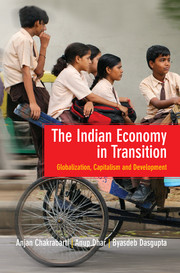Book contents
- Frontmatter
- Contents
- Preface
- Introduction
- Chapter I The Condition of the Working Class in Contemporary India
- Chapter II Capitalism: The ‘Delusive Appearance of Things’
- Chapter III Post-colonial Development and ‘The Thought of the Outside’
- Chapter IV The Word and the World of Neo-liberalism
- Chapter V The Scrypt of Transition: Between the Spectral and the Secret Thereof
- Chapter VI From Self-reliance to Neo-liberalism: The Political Economy of ‘Reform’ (1991–2014)
- Chapter VII Global Capitalism and World of the Third: The Emergent Cartography of the Indian Economy
- Chapter VIII Inclusive Development, State and Violence
- Chapter IX From Economic Crisis to Transition Crisis
- Conclusion
- Bibliography
- Author Index
- Subject Index
Chapter I - The Condition of the Working Class in Contemporary India
Published online by Cambridge University Press: 18 December 2015
- Frontmatter
- Contents
- Preface
- Introduction
- Chapter I The Condition of the Working Class in Contemporary India
- Chapter II Capitalism: The ‘Delusive Appearance of Things’
- Chapter III Post-colonial Development and ‘The Thought of the Outside’
- Chapter IV The Word and the World of Neo-liberalism
- Chapter V The Scrypt of Transition: Between the Spectral and the Secret Thereof
- Chapter VI From Self-reliance to Neo-liberalism: The Political Economy of ‘Reform’ (1991–2014)
- Chapter VII Global Capitalism and World of the Third: The Emergent Cartography of the Indian Economy
- Chapter VIII Inclusive Development, State and Violence
- Chapter IX From Economic Crisis to Transition Crisis
- Conclusion
- Bibliography
- Author Index
- Subject Index
Summary
This work begins with ‘labour’, with the question of labour, as also with the ‘framework’ to analyze the condition of labour in contemporary India. The Condition of the Working Class in England by Engels (1845) focused on worker's wages and their living conditions, which offered necessary empirical ground for the subsequent writing of Capital by Marx. The framework of analyzing the ‘condition of the working class in India’ could be a prelude to the possible writing of Capital in the contemporary. It is a prelude towards making sense of a triadic and split contemporary, marked by the overdetermination and contradiction among capitalism, development and neo-liberal globalization.
This chapter intervenes in the question of labour in four ways. First, it lays down a window to look at labour; a close look at labour encompasses diverse labouring practices, including gender and caste imbrications, and the equally varied ways in which wealth resulting from labouring practices is appropriated, distributed and received. This decentered and disaggregated perspective to labour gives way to a new meaning of the economy. The new meaning builds on a particular Marxian approach that has developed in the last three decades. More specifically, known as the class-focused theory (not class specific or class centric), this approach seeks to produce an alternative economic cartography in terms of ‘class defined as processes of performance, appropriation, distribution and receipt of surplus labour’ and the epistemology of overdetermination, which argues that class processes are in a mutually constitutive relation with non-class processes. Second, class focused rendition of the economy produces in turn the possibility of a number of coexisting social formations and labour relations, with capitalism being one (not the only) form. This entails that capitalism is a part and not the whole of an otherwise disaggregated, decentered and complex class focused whole, called the economy; as a result labouring processes are also polymorphous (not just multiple); the same labouring individual may move from one kind of class process to another, and occupy multiple class positions at the same time. Because, the capitalist class process, capitalism and the economy are conceptually distinct, any attempt to reduce the economy to either capitalism or the capitalist class process is moot.
- Type
- Chapter
- Information
- The Indian Economy in TransitionGlobalization, Capitalism and Development, pp. 1 - 41Publisher: Cambridge University PressPrint publication year: 2015



